“It’s never too late to start.”
“Age is just a number.”
These age old (no pun intended) adages are passed around a lot in the fitness community. Although often only meant as a means of inspiration, they may have a lot of truth to them as well, scientifically speaking. When it comes to improving physical and mental health, longevity, and quality of life, fitness might be one of the best means to do so. So we decided to do a deep dive on how and why CrossFit® training can be a valuable fitness option for people over the age of 60.
Below are some of the major topics we cover:
- Why People 60+ Years Old May Be Interested in CrossFit
- How/Where to Start
- Competitive CrossFit
- CrossFit Masters Athletes
- What the Experts Say
In addition to better educating about how CrossFit® training can help build a stronger body, mind, and community, this article aims to be a go-to reference for common exercises and how to get involved in competitive events.
Editor’s note: The content on BarBend is meant to be informative in nature, but it shouldn’t take the place of advice and/or supervision from a medical professional. The opinions and articles on this site are not intended for use as diagnosis, prevention, and/or treatment of health problems. Speak with your physician if you have any concerns and before starting any new dietary or training regimen.
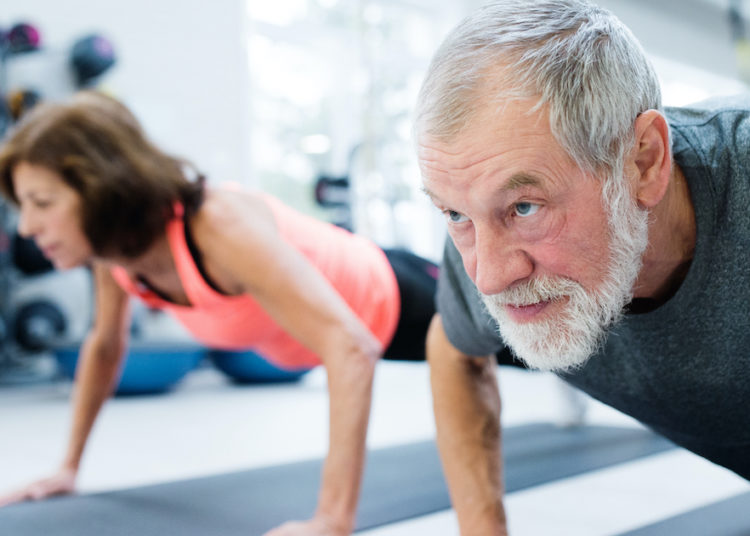
[Related: The ultimate guide to strength sports for Masters athletes]
The Appeal of CrossFit
Functional fitness is a classification of training that incorporates movements akin to what a person would perform in their day-to-day life. This can include squats, lunges, jumps, pulling movements, and cardio (running, biking, etc.). CrossFit® methodology adds in Olympic weightlifting (snatches and clean & jerks), powerlifting (deadlifts, front and back squats), explosive movements (using medicine balls, kettlebells, etc.), gymnastics, and some specialized movements such as rope climbs, sled work, and rowing.
There are many potential health benefits, so let’s dive into what it can specifically offer athletes over the age of 60.
It is important to note the culture of support around the CrossFit® community. It is one of the most important means for acquiring new members as well as maintain those who have already been initiated. According to a 2018 systematic review and meta-analysis in the Sports Medicine Open, “preliminary data has suggested that CrossFit® practice is associated with higher levels of sense of community, satisfaction, and motivation.” (1)
Longevity
It is likely the case that one of the biggest draws for anyone thinking of getting into CrossFit® training is improving longevity while maintaining or bettering physical capability. The evidence showing correlations between endurance training, high intensity interval training (HIIT), and high intensity functional training (HIFT) and longevity is pretty extensive.
Fifty-four peer-reviewed publications found considerable support for “superior longevity” for people involved in endurance related sport. (2) More specifically, a study in the Journal of Aging Research determined a physically active subjects had a higher life expectancy of upwards of 7 years.
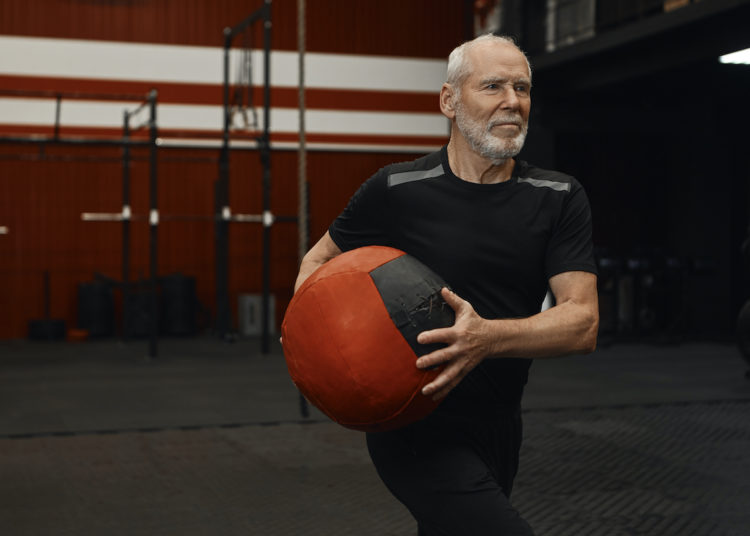
A 2013 study in Population Health Management recognized that a critical need for senior-oriented programs that improve health and preserve and extend functional capabilities. The relationship between these improvements also led to reduced health care expenditures. (3)
Physical Fitness
For those who have not had a consistent training program, the intensity that comes along with CrossFit® training might be intimidating. Don’t worry, there are ways that new trainees can perform workouts without extending past their abilities or what is comfortable for them. One of the major ways is called scaling (more on this later).
Rest assured that the science is behind getting active to improve physical fitness even in the elderly. Progressive strength training in the elderly is an efficient way to reduce sarcopenia and retain motor function, even at higher intensities, according to a 2011 study in the Deutsches Arzteblatt International. (4)
Furthermore, anyone who may be skeptical about the safety of higher intensity exercise, HIFT is not necessarily any riskier than any other form of exercise at a relatively equal intensity. A 4-year analysis that oversaw 3,049 participants completed in 2018 in the Orthopedic Journal of Sports Medicine suggested that “CrossFit training is relatively safe compared with more traditional training modalities.” (5)
Not only is getting physically active a smart choice for overall fitness levels, it might actually be better to train more days per week than less. That same 4-year analysis uncovered training for the majority of days per week could lead to fewer injuries. Those at the greatest risk of injury, primarily to their shoulders and back, were the participants who performed less than 3 workouts per week.
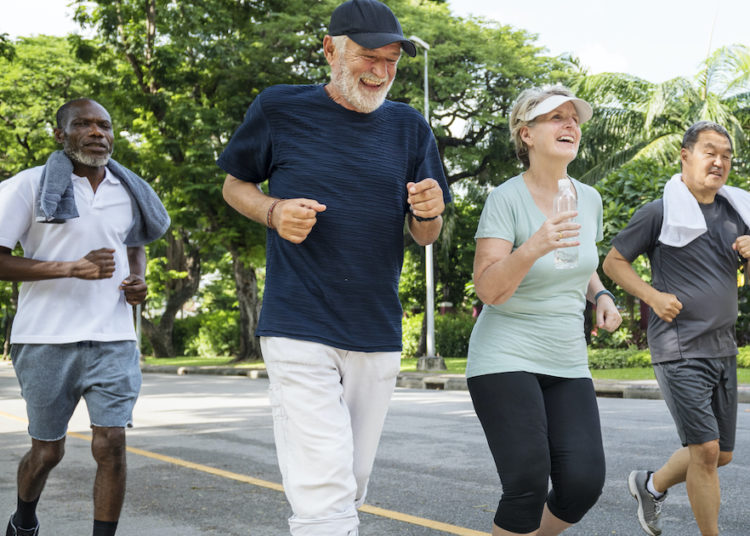
For athletes over the age of 60 participating in CrossFit® training for the first time, there should be some comfort knowing that the risk of injury is “similar…to other sports” according to a 2020 study in the Journal of Human Kinetics. (6) To further reduce the risk of injury, athletes are better off doing an adaptation period with the aim of improving technique. Good news: improving technique is a touchstone of CrossFit® methodology.
Technique, which is defined in the CrossFit® level 1 training guide as “quality of movement”, is “an intimate part of safety, efficacy, and efficiency. Technique is everything. It is at the heart of our quantification. You will not express power in significant measure without technique.”
Scaling
So how does CrossFit® training adjust for those who have never done it before? They do so through scaling.
Scaling is the process of adjusting a workout or movement to better match the abilities of the person performing it. It is also a way to customize training for a person’s needs at any given time. Feeling sore from a previous training session? Scale the workout. Feeling some tenderness in a muscle or joint and are concerned about aggravating it? Scale the workout.
Scaling is very important when learning a new lifting pattern. If someone has never performed a particular movement, it doesn’t make much sense to load up a ton of weight and hope for the best. Remembering the importance of technique — regardless of age or fitness level — is key. CrossFit® trainers are generally eager to work with clients to find the right movement patterns for their needs and goals.
As the trainee who will be performing the exercises, be sure to clearly articulate your goals. They can be as simple as wanting to walk up the stairs more efficiently or picking things off the ground without causing back pain. Scaling allows the trainer and the training itself to help further you toward whatever your goals may be.
Community
Training in a group environment makes participants more motivated and more reliable the longer they do it. A 2019 study in the PLoS One (the Public Library of Science) looked into how motives differ by length of participation. They concluded that the enjoyment and challenge of HIFT was a sufficient motivator when beginning, and that this exercise form “promotes an increase in those motives with greater length of participation.”
The study also concluded that “interpersonal motives (representing relatedness) also increase with participation time.” (7) A 2017 study in BMJ Open Sport and Exercise Medicine further reinforces these ideas with their findings that group exercise helps participants “meet recommended levels of physical activity”. (8)
The community aspect of CrossFit enables a higher likelihood that people will exercise and enjoy it the more they do it. A 2017 study in BMC Geriatrics concluded that “regular group exercise contributes to balanced health in older adults…and helped them to improve or maintain their functional health and enjoy their lives.” (9)
Disease Prevention
There may be concerns for those above the age of 60 to get involved in any sort of group fitness. However, there are strong arguments to be made about ensuring exercise remains a part of the routine for seniors. In a 2018 study in Frontiers in Immunology that analyzed exercise-induced immune suppression, scientists found “that leading a physically active lifestyle reduces the incidence of communicable (e.g., bacterial and viral infections) and non-communicable diseases (e.g., cancer), implying that immune competency is enhanced by regular exercise bouts.”
They concluded that “that leading an active lifestyle is likely to be beneficial, rather than detrimental, to immune function, which may have implications for health and disease in older age.” (10)
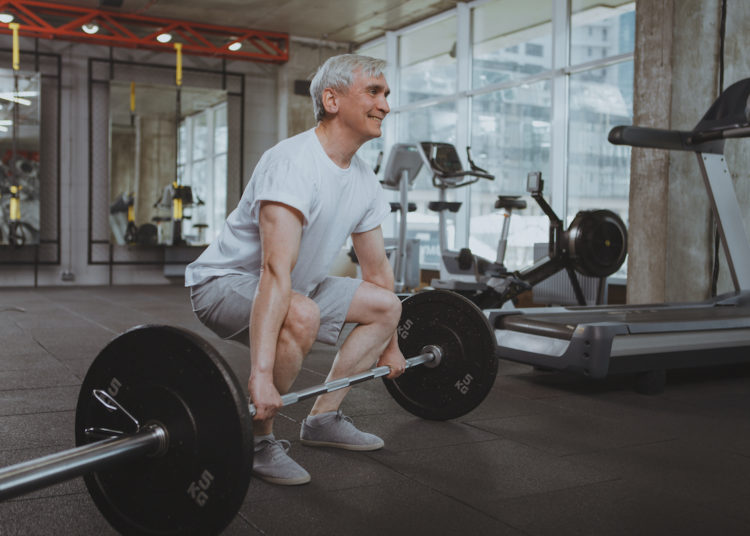
Exercise has shown to aid other issues such as peripheral arterial disease and helps suppress the most common age-associated chronic conditions. (11) In a 2015 study in Rejuvenation Research, scientists found that “physical exercise is…largely the answer” to “attenuate many of its deleterious systemic and cellular effects”. (12)
How to Start
Functional fitness training has potential benefits for physical and mental health, and longevity. But how and where does one sign up?
If you’re interested in joining a CrossFit® affiliate, you’re in luck; as of early 2020, there are 14,790 total CrossFit® affiliates globally. You can start by checking out the Official CrossFit® Affiliate Map that can help locate the nearest CrossFit® boxes near you.
When beginning, a coach will teach how to do the movements properly and adjust them as needed for your current fitness level (scaling!). CrossFit.com has quick tutorials that break down the movements so they can be practiced from home. There are also courses that “anyone seeking to improve their health and fitness through effective training and nutritional strategies” can take.
Here is a list of guides for the non-bodyweight movements you are likely to encounter that you can refer to:
- Squat
- Front Squat
- Shoulder Press
- Overhead Press
- Push Press
- Snatch
- Kettlebell Snatch
- Kettlebell Swing
- Clean & Jerk
- Deadlift
- Thruster
- Wall Balls
- Running Warm-Up
Here is a list of guides for bodyweight movements:
If you are ever in a position where you don’t have access to the requisite equipment, scale it and/or check out our CrossFitter’s guide to movement substitutions.
[Related: 8 things I wish I’d known before starting CrossFit]
Competitive CrossFit
Whether you’re just starting out in CrossFit® training or are actively looking to compete, being aware or even knowledgable about higher levels of competition can’t hurt. It might even provide a means of inspiration. Here is a quick rundown of the pinnacle of CrossFit® competition — The CrossFit Games — and how athletes get there.
It takes place once per year, is broadcast and live-streamed internationally, and features individual, team, and age group competition (teens and Masters divisions). There are four main ways to qualify for the CrossFit® Games: Open, Sanctionals, Online Qualifiers, and Invitations.
The Open
The Open is a worldwide event that spans five weeks. Each week, a workout is released and participants are allotted four days to record their performance and submit it for review. Upon completion of the Open, the top ranked man and woman — using a relative scoring system — from each participating country is declared national champion (based on citizenship) and is offered an invite to the Games. In addition to the national champions, the top 20 men and women in the Open worldwide also receive invites.
Athletes’ results for each workout and their respective rankings are tracked via the CrossFit® leaderboard. Leaderboards can be customized to highlight members of a group, profession, location, etc. so even if you don’t have interest in higher competition, you can see how you stack up against a particular group.
Sanctionals
According to CrossFit’s website, “Sanctionals are independently owned and operated (and CrossFit-licensed) fitness competitions that offer another pathway for top men, women, and team athletes to receive invitations to compete at the CrossFit Games.”
There were 28 Sanctionals planned around the globe that fed into the 2020 Reebok CrossFit® Games. 26 teams (each comprised of 2 men and 2 women), 40 teens, and 120 Masters athletes are invited to the Games under the current format.
CrossFit Masters Athletes
In competitive CrossFit®, there are six Masters divisions that each span 4 years starting at age 35 up to the age 60+ division. Jarka Giangiulio and Patricia McGill are age 60 and 61, respectively, and are both CrossFit® Games athletes. 72-year-old Laura Bruzzone did not get started in the sport until age 67 and has some valuable advice to offer others who are considering doing the same. Below are their thoughts on CrossFit® including their introductions to the sport and what motivates them to continue training.
Jarka Giangiulio
Giangiulio achieved her first muscle-up at age 60 and is capable of deadlifting 285lb. She spent the first half of her life in Slovakia and has since been in the United States and trains at CrossFit® Parallax in New Jersey. She placed seventh in the women’s 60+ division in the CrossFit® Games Age Group Online Qualifier to earn a spot at the 2020 Reebok CrossFit® Games.
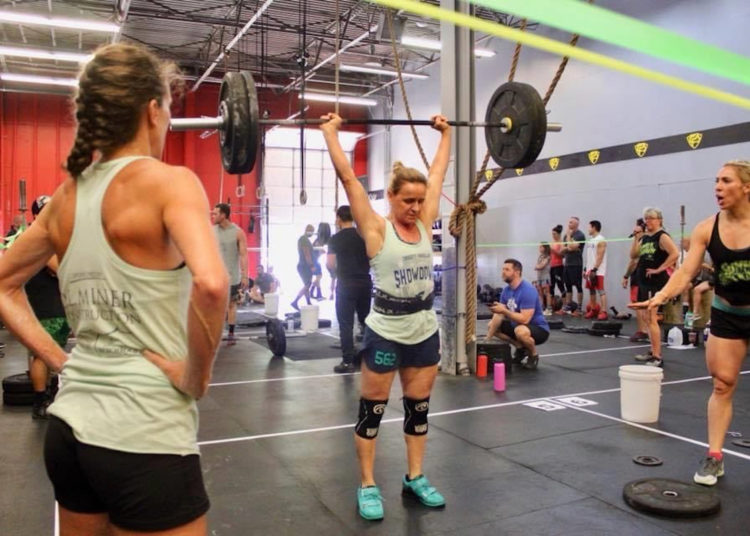
She started CrossFit® in 2011 after getting her fitness in via aerobics, spin, and bootcamp classes. When asked what drives her to compete, Giangiulio responded:
“…there’s this rush when you compete, and that feeling you get when you finish and you know you did well, it’s amazing. It’s hard to explain. But it’s just good energy, and everyone is supporting you and cheering for you.”
Another big draw to CrossFit® is the efficiency of the training.
“…with CrossFit, there’s always room for improvement, always something you can work on. I really like that. And I like that in just seven minutes, you can get a really hard workout and be done with it.”
Patricia McGill
McGill began training CrossFit® in 2013 and was the runner-up at the 2019 Reebok CrossFit® Games in the 60+ division. She then followed it up with a 3rd place finish in the CrossFit® Games Age Group Online Qualifier last fall. She trains six days a week and even performs workouts in her backyard.
I said to my husband, “Honey, if I dig a hole, will you cement a pole so I can practice muscle-ups?”
She splits her training between home workouts and sessions at the gym. Her basement is set up with kettlebells, dumbbells, a rowing machine, and the requisite Olympic weightlifting equipment. Her backyard is outfitted with a rope for climbs, a step for wall balls, and the aforementioned pole to support rings to allow for pull-ups and muscle-ups.
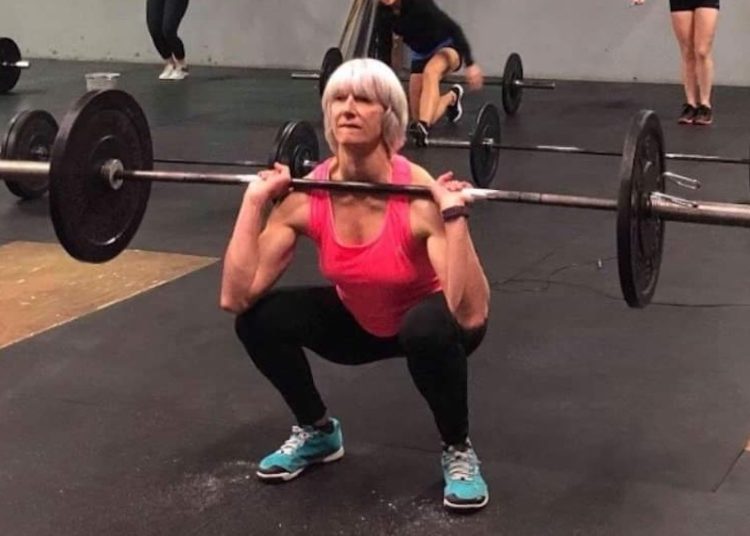
When asked what keeps her motivated to train into her 60s, McGill responded:
“I just want to be able to continue to do whatever I want for the rest of my life.”
[Read More: The Best Compact Exercise Equipment for Any Small Space]
Laura Bruzzone
The 72-year-old Bruzzone took up CrossFit® five years ago after it was recommended to her by a friend. In her interview with Good Morning America, Bruzzone shared some advice for potential fellow Masters athletes:
You certainly shouldn’t let age or anything else hold you back. So long as you don’t give up and you do something, you’re going to get payback, definitely.
Bruzzone’s training sessions and feats of strength in a CrossFit® gym went viral as a means of inspiration for younger athletes. However, Bruzzone found the opposite to be true as she feels younger athletes inspire her:
“I see the younger people doing heavier weights and I want to get closer to what they’re doing. It’s more motivation for me to push harder.”
Although Bruzzone has never competed in the CrossFit® Open or at the Games, she still trains at 6am on most days, and only takes a rest day when she feels it necessary. Her fitness goals are positioned to think long term.
“…I have a long range plan. When I’m 90, I want to get to the bathroom by myself.”
What the Experts Say
We reached out to two doctors of physical therapy, Dr. Joseph LaVacca and Dr. Eugene “Bo” Babenko — who is also a certified CrossFit® trainer. They discussed the benefits and obstacles (both physical and mental), the remedies to those obstacles, personal experiences they’ve had with their patients, and advice they would offer those starting out in functional fitness training.
Note: all bolding is done by BarBend’s editorial team for emphasis.
Do you think seniors should get involved in CrossFit or functional fitness training?
Dr. Babenko
“Functional fitness is the key here — YES — the way we think about aging is all sorts of messed up. If seniors, or any human of any age, want to be able to use their bodies, then they need to do some type of training to maintain it just like we do maintenance on our cars. While there is a natural degradation that comes with each day/month/year, it is all about managing that damage that allows us to improve “healthspan”, which implies the ability to be a more robust human for longer. If folks want to live longer and be able to do more things, then they 100% should participate in some kind of training program or movement practice.
Dr. LaVacca
“Yes, without a doubt. Seniors biggest opportunity as they age is the loss of muscle mass, mainly power, and a narrowing social circle which is actually the number one factor for most of their stress and ailments. CrossFit® is the perfect solution to both given classes are guided by coaches who understand the aging process and can be scaled accordingly to fit the capacity of each client.
More and more we are seeing research support the idea that we are not our x-rays or MRIs and a lot of the “dysfunction” we see with these images can sometimes be nothing more than normal age related changes our bodies go through as we continue to use them.”
[Read More: The Best Weighted Vests, Picked by Trainers and Coaches]
What are the most common physical ailments that you encounter in your patients that you believe CrossFit training can help improve?
Dr. Babenko
“General de-conditioning is the number one overall ailment — many of the cliches come to mind. Do we age because we stop dancing, or do we stop dancing because we get old? You are only as old as your joints feel.
The most common things that put folks in retirement homes or the morgue are a fall and broken hip — the best way to combat this is to improve range of motion, proprioception, and strength. Leg strength, grip strength, and VO2 max are all incredible predictors of our mortality and can all be improved with “functional training”.
[CrossFit] also recently had a huge push for “CrossFit Health”, where they had seniors as the demo folks in a living room, using water bottles and such — this is a great message and speaks to the fact that we all need to be partaking in some version of fitness for our entire lives and the barrier to entry should be very low.”
[Read More: The Best Functional Trainers to Add to Your Home Gym]
Dr. LaVacca
“As we age we are typically met with increasing co-morbidities such as weight gain, mental health issues, and changes to our cardiovascular systems (blood pressure/heart rate). I think community outreach and education can be an affective remedy. This population has survived and thrived through a lot of stress and changes in their lives. They very rarely want to be thought of as delicate, old or fragile. Holding 60+ classes to make people fit into a more common group of people, educating primary care physicians on the benefits of exercise as we age.
Aside from reduction in depression, anxiety and improved sleep, exercise has been shown to add years to your life, something that we can all likely agree is the ultimate benefit.”
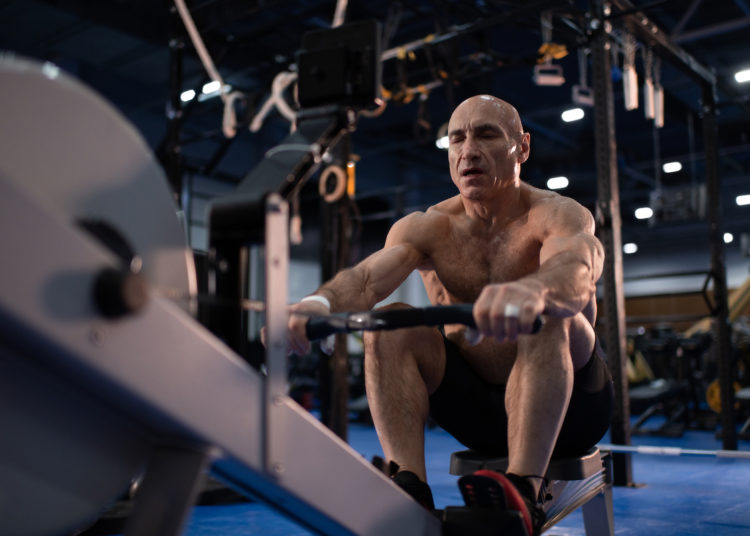
In your experience, what is the biggest obstacle for seniors to get into CrossFit?
Dr. Babenko
“The biggest obstacle is fear/marketing — it looks scary — usually these CrossFit® gyms have only young folks with shirts off huffing and puffing and making very loud noises of all sorts.”
Dr. LaVacca
“Culture seems to be the biggest obstacle for just about everything these days. When you are told that aging population is fragile, or should stop doing certain movements/exercises, or that their joints are “bone on bone”, those are the kind of thought viruses that spread very quickly, usually promoting fear and avoidance rather than reframing and lateralization.”
Have you found any effective remedies to those obstacles?
Dr. Babenko
“Most effective remedies I have seen are specific “silver sneakers” programs — specific marketing to get folks to see others in their age range can and are doing this, and not getting injured. Sometimes it’s important to connect it to activities that are important to that population.”
Dr. LaVacca
“I think community outreach and education can be an affective remedy. This population has survived and thrived through a lot of stress and changes in their lives. They very rarely want to be thought of as delicate, old or fragile. Holding 60+ classes to make people fit into a more common group of people, educating primary care physicians on the benefits of exercise as we age. Aside from reduction in depression, anxiety and improved sleep, exercise has been shown to add years to your life, something that we can all likely agree is the ultimate benefit.”
What are the biggest benefits?
Dr. Babenko
“Biggest benefits for CrossFit seem to be the increased ability to do the activities that we hold dear and overcome many of the aches and pains that we have built up over time. Another thing that works is one-on-one training with very personalized progressions. It is easier to throw constantly varied workouts at younger folks — but as we develop more limitations we require more personalized attention to get better results and avoid injury.”
Dr. LaVacca
“These patients have more lean body mass, recover from injuries quicker, usually have jobs that they find more satisfying, are on little to no medications, and most important can envision their future and can continue to create goals both personally and professionally. One thing that happens as clients get older, retire, watch their kids grow is that they lose a sense of purpose. Those that maintain and active mind and body experience the same stressors but demonstrate more resilience when facing them.
[Read More: The Best Mass Gainers, Tested by Experts and RD Approved]
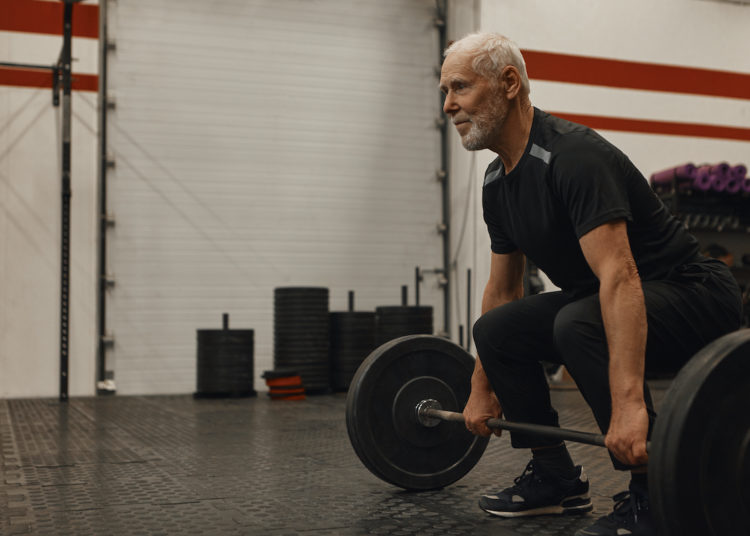
Have you worked with anyone over 60 who does perform CrossFit?
Dr. Babenko
“Absolutely, I have worked with a number of folks above 60. Their performance far exceeds anyone in their cohort who does not. They are addressing so many physical factors. I also work as a home health physical therapist and I have seen everything from COVID pneumonia cases, stroke cases, etc., and no matter the age and function, I utilize many of the principles of CrossFit® for my patients to help them improve and address their various impairments.”
What specific health benefits have your patients gained from their training in CrossFit?
Dr. Babenko
- Decreased aches and pains.
- Improved aerobic capacity, less shortness of breath.
- Return to sports like golf, hiking, playing with grandkids.
- Sexual health also is significantly improved [due to] improved range of motion and endurance.
Dr. LaVacca
- More lean body mass.
- Recover from injuries quicker.
- Usually have jobs that they find more satisfying.
- Are on little to no medications.
- (most important) Can envision their future and can continue to create goals both personally and professionally.
One thing that happens as clients get older, retire, and watch their kids grow is that they lose a sense of purpose. Those that maintain an active mind and body experience the same stressors but demonstrate more resilience when facing them.
Are there any non-physical benefits that you’ve noticed in your patients who train CrossFit?
Dr. Babenko
- Increased confidence.
- Community.
- Purpose.
Dr. LaVacca
“Socialization hands down. The communities I have watched grow, and the friendships formed, allows for people to cheer for each other because they truly want what is in the best interest of the other person. CrossFit communities plan nights out, go to each others weddings, and even spend holidays together. As the gym grows, so does your family.“
If a patient were to start training CrossFit, what advice would you give them?
Dr. Babenko
“I would want to make sure they understand what the term “CrossFit” refers to. I would want them to be an educated consumer and ensure that the coach/trainer they work with has some experience with similar pops and/or is able to provide them with a personalized plan to keep them safe and still reaping the benefits that the community setting brings.”
Dr. LaVacca
“That is great and I am proud of their decision. I would encourage them to look at their goals:
- Why are they joining?
- What do they hope to achieve?
- How long are they willing to work for their goals?
I would further suggest having a personal trainer that can work with their coach on your team. Where I think the biggest opportunity for community classes of all sorts to continue to evolve is providing information and understanding about each member’s individual capacity.”
Any additional thoughts on CrossFit?
Dr. Babenko
“I think the concept is phenomenal. I fell in love with it when I did my first workout and then did the CrossFit Level 1 certification. But since I entered the community in 2010, I have seen many versions of the original message create many watered down versions. It is going through some interesting changes with…Glassman…selling the company. It will be interesting to see how it progresses.”
Dr. LaVacca
“In general I have been a huge fan and advocate for CrossFit® since I began my career in 2010. Unfortunately the average career of a HIIT or CrossFit® athlete (based on memberships) seems to be less than 3 years. This was presented at a Sports Symposium in Philadelphia not too long ago that I was able to attend.
This is the biggest opportunity for HIIT classes. Build consistency. The community is there, but people are scared and think “this is not for me” or “I could never do that.” Everyone is waiting to feel better to move or workout, rather than working out to feel better.
In addition, sometimes culture leads us to believe that we need to be emptying the tank all the time. That we need to be pouring sweat, not have an off day, or complete an insane challenge that we are not ready for to “fit in”. I would love to see more scaling to keep people safe, not just an RX and an alternative with less weight or reps — something meaningful where this group can look at each other and say I am here and I am with other people just like me, and I do not have to be forced to do what is on the board.
I do believe that if every gym followed a CrossFit® type model in a responsible manner, the world would be a healthier and stronger place.”
Wrapping Up
The science is clear. CrossFit® training can enable people over the age of 60 the ability to improve their physical fitness, their ability to day-to-day activities more efficiently, and their ability to prevent disease. It can offer a supportive community that can better ensure consistency in the gym and make workouts more enjoyable.
For those above 60 years of age looking to improve their futures, CrossFit® training’s focus on individual goals and proper technique might be the way to go. There are CrossFit® affiliates are all over the world that can help you get a foothold in that community and build your body for many years to come.
References
- João Gustavo Claudino, et al. (2018). CrossFit® Overview: Systematic Review and Meta-analysis. Sports Medicine Open. doi: 10.1186/s40798-018-0124-5,
- Srdjan Lemez and Joseph Baker. (2015). Do Elite Athletes Live Longer? A Systematic Review of Mortality and Longevity in Elite Athletes. Sports Medicine Open. doi: 10.1186/s40798-015-0024-x.
- Brent Hamar, et al. (2013). Impact of a Senior Fitness Program on Measures of Physical and Emotional Health and Functioning. Population Health Management. 16(6): 364–372. doi: 10.1089/pop.2012.0111.
- Frank Mayer, et al. (2011). The Intensity and Effects of Strength Training in the Elderly. Deutsches Arzteblatt International. doi: 10.3238/arztebl.2011.0359.
- Yuri Feito, et al. (2018). A 4-Year Analysis of the Incidence of Injuries Among CrossFit®-Trained Participants. Orthopedic Journal of Sports Medicine. doi: 10.1177/2325967118803100.
- Yaira Barranco-Ruiz, et al. (2020). Prevalence of Injuries in Exercise Programs Based on Crossfit®, Cross Training and High-Intensity Functional Training Methodologies: A Systematic Review. Journal of Human Kinetics. 251-265, doi: 10.2478/hukin-2020-0006.
- Allyson G. Box, et al. (2019). High Intensity Functional Training (HIFT) and competitions: How motives differ by length of participation. PLoS One. doi: 10.1371/journal.pone.0213812.
- Monique Gilbert, et al. (2017). Perceptions of group exercise courses and instructors among Quebec adults. BMJ Open Sport & Exercise Medicine. doi: 10.1136/bmjsem-2017-000278.
- Komatsu, H., Yagasaki, K., Saito, Y. et al. Regular group exercise contributes to balanced health in older adults in Japan: a qualitative study. BMC Geriatrics 17, 190 (2017). doi.org/10.1186/s12877-017-0584-3.
- John P. Campbell and James E. Turner. (2018). Debunking the Myth of Exercise-Induced Immune Suppression: Redefining the Impact of Exercise on Immunological Health Across the Lifespan. doi: 10.3389/fimmu.2018.00648.
- Tara L. Haas, et al. (2012). Exercise Training and Peripheral Arterial Disease. Comprehensive Physiology. 2933-3017. doi: 10.1002/cphy.c110065.
- Nuria Garatachea, et al. (2015). Exercise Attenuates the Major Hallmarks of Aging. Rejuvenation Research. 18(1): 57-89. doi: 10.1089/rej.2014.1623.
Feature image via Shutterstock/Halfpoint.